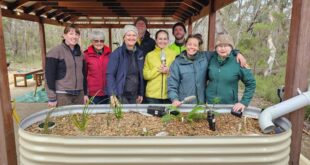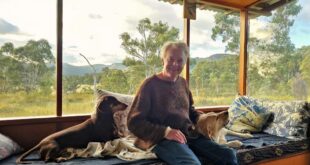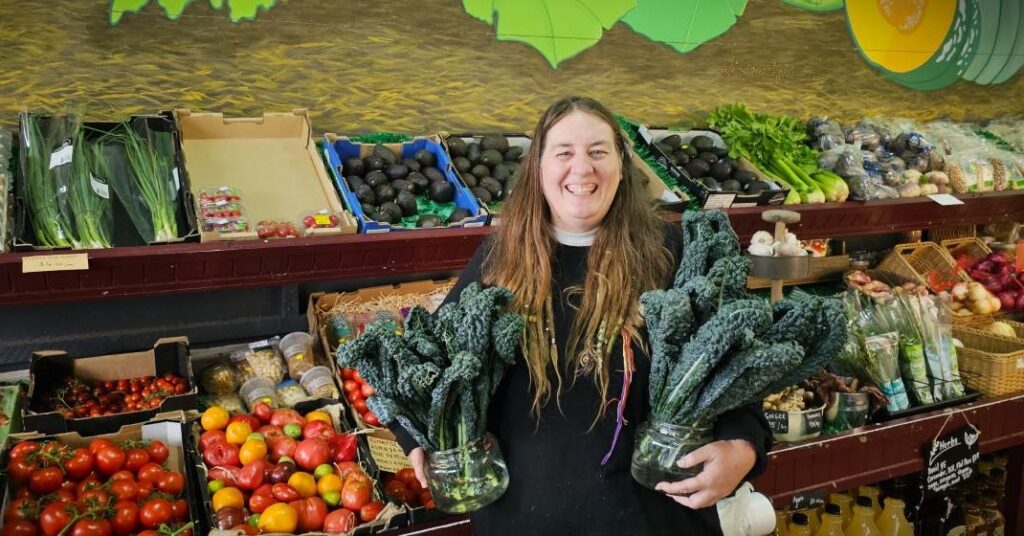
Mel Michael at Blackheath Vegie Patch with kale from a local’s garden.
Story and photos by Hamish Dunlop
Mel Michael is the newish owner of the Blackheath Vegie Patch. We talk about making lemonade from local lemons, a philosophy of abundance, and how businesses can help make communities more resilient.
Key Points:
- The Blackheath Vegie Patch recently changed ownership and direction.
- New owner, Mel Michael, is passionate about food and takes a community-minded approach.
- To reduce food miles, support local food security and provide the freshest food possible she sells produce grown by locals and farmers as well as food sourced from Flemington Market.
In just a few months Mel Michael has transformed the local Vegie Patch into a community-engaged enterprise that honours the produce, the producers, and the power of connected community. “We’re not individuals on islands,” she tells me as we sit out the back on milk crates. “I just want people to be more in touch with their food, that’s my driving force.”
As well as a full array of fruit and vegetables, Mel sells seedlings. She also donates seedlings to the community gardens in Blackheath and Blackheath Public School on a fortnightly basis. This stems from her philosophy of abundance. “Someone said to me, ‘If people buy seedlings and you give these plants to the community gardens, you’ll get less sales. My response is, that’s not what’ll happen. What will happen is that we’ll be a healthier community and more people will eat good food.”

Seedlings and herbs outside the store
Affiliate Growers Program
The Affiliate Growers Program Mel runs speaks volumes about how she sees herself and the role of the store in the community. Community members can bring in produce and exchange it for store credit. “All people need is a few square metres of garden and they can register with us,” she says. “I don’t mind if it’s six bunches of basil a year, or five kilos of tomatoes. Affiliate growers also get discounts on seedlings.”
Mel says the program has social and economic benefits. “I hear a lot of older people say they used to have food gardens, but they don’t now because it’s too much. When the gardening stops though, so do the other benefits of having fresh food to hand, moving about, being outside and getting your hands in the dirt.”
The other day, one of the resident growers came into the Vegie Patch with a few bunches of kale. Kale was in short supply, so it helped the store out and supported local cafes in the process. The man who grew the kale decided to use his credit to get Black Cockatoo Bakery sourdough. Mel grins, “He’s made it his mission to get free bread for a year from his little garden plot.”
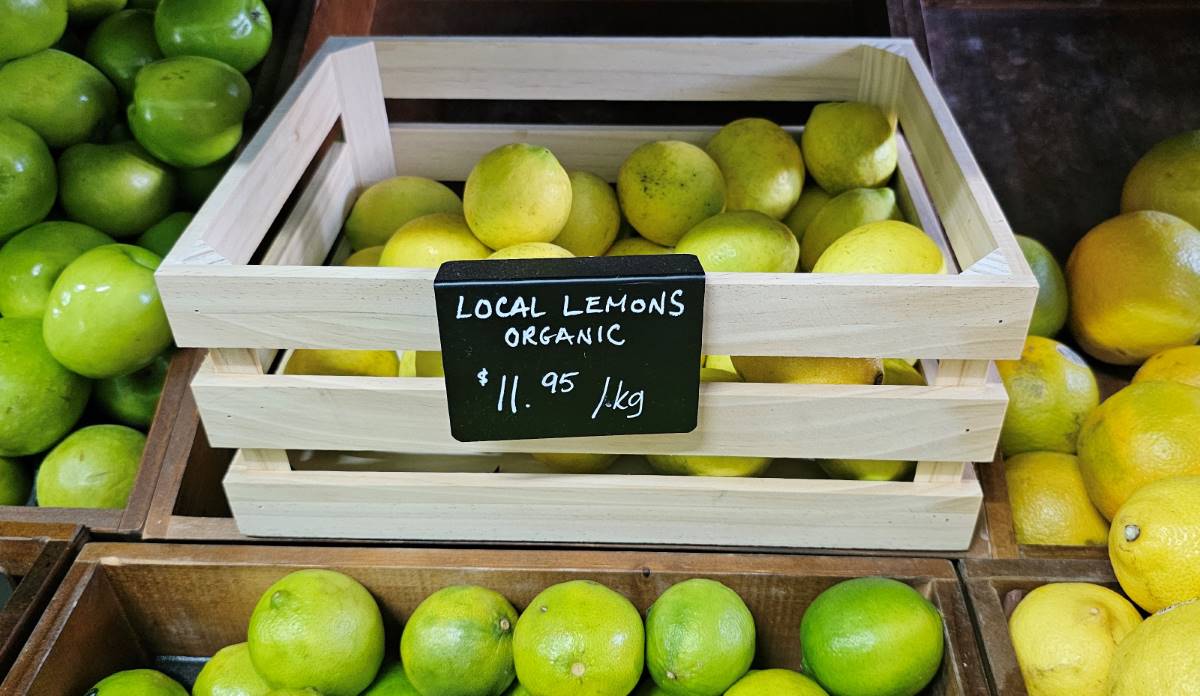
Lemons grown locally
Lemonade from lemons
She tells me about a local man who came in and mentioned he had a lot of lemons that were going to end up rotting on the ground. Mel bought 47kg in total. “They weren’t perfect lemons, but they were local. I put a sign up saying, ‘Steven’s local lemons’ and they flew off the shelves while the glamour lemons from the market didn’t move.”
“He was really chuffed to see people buying his lemons,” Mel says. “We had number of conversations too, which was great. When you live alone for example, that kind of contact is precious. I’ve been on the hard end of isolation and at those times, you just want someone to talk to you. Blackheath is amazing like that. If you watch the street, there are always people about. People that you can strike up a conversation with.”
Locally grown food security
One of the interesting things about locally supplied fruit and vegetables is that it makes communities more food resilient. Weather events in different parts of the country and other factors can affect supply. When Steven came in with his lemons, the price at Flemington Market was $180 per box. His supply meant that Mel was able to keep the cost of lemons at a reasonable price for another five or six weeks. “It’s a benefit to the community,” Mel says.
Having just started the business, much of the produce Mel sells comes from Flemington Market. However, her aim here as with everything, is to buy locally and buy ethically. She’s talking with Lot 101 in the Megalong and is interested in any other local growers. She’s also keen to make ethical choices when it comes to purchasing. “I’ve found a farmer who is going to grow all my potatoes,” she says. “My commitment to him is that I will buy all his potatoes at a good price. I won’t chop and change, or not commit to how much I will purchase.”
All service, no waste
Nothing is wasted in store. If the community gardens need cardboard to suppress weeds, then that’s available. Food that is no longer shop-ready but perfectly edible, goes to a cook who makes soups for Blackheath Area Neighbourhood Centre. People collect older produce for their chickens and what’s left is composted. Blackheath Community Farm is one of the benefactors of compostable material.
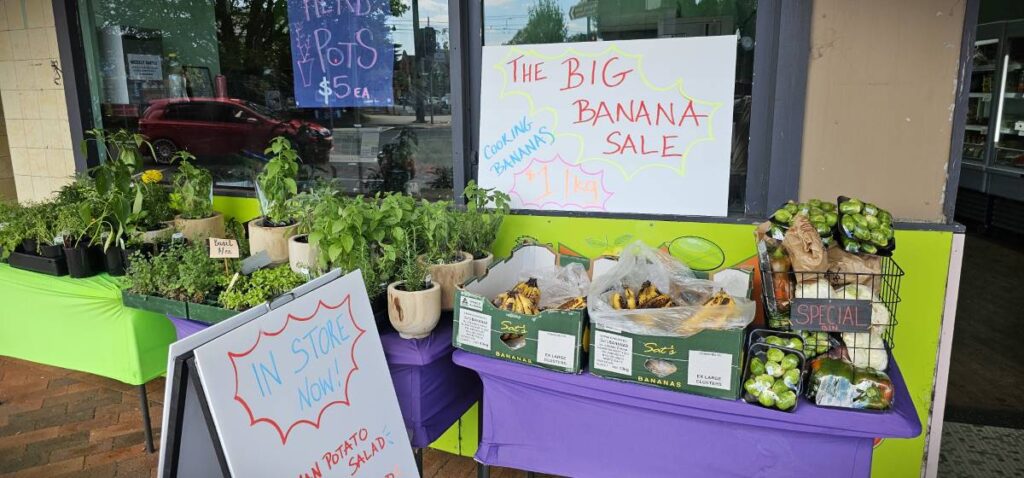
Cooking bananas on sale outside the shop
Mel sells stir-fry and soup packs and bananas labelled for cooking. She’s created a juice bar so excess berries and other fruit can be frozen and used when needed. She tells her staff that the store can be a place to engage with the community. “If someone’s got lemon grass in their basket and potatoes and onion, I might ask if they’re making a curry of some kind,” Mel says. “Even if they’re not, we’ve exchanged some words and interest. It’s fleeting, but it’s connection.”
Mel thinks this is what real service looks like. “If I notice an older person pausing in front of the pumpkins, maybe their arthritis is stopping them making the purchase. I have one lady who comes in and we cut half a pumpkin into five pieces. She gets me to leave the skin on because she bakes it in the oven. You can’t get anything cut or peeled at Woolworths, but we can do that.”
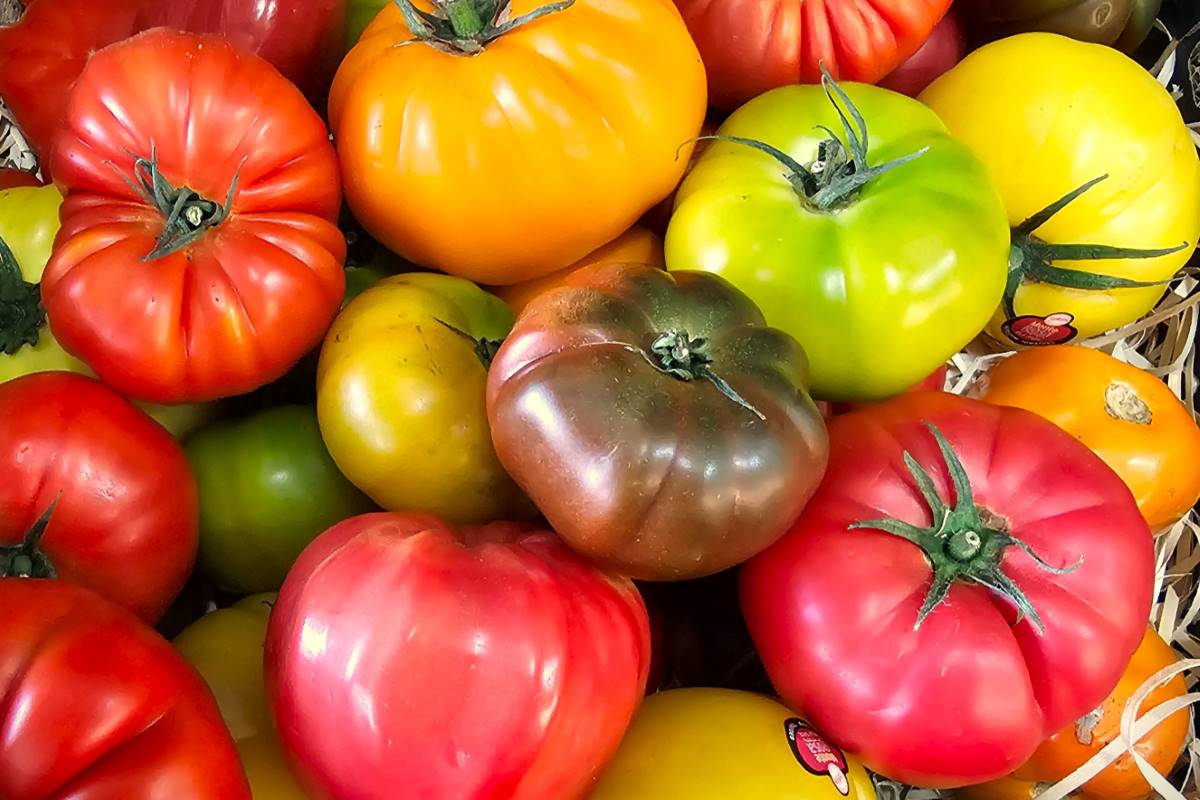
Heirloom tomatoes at the Vegie Patch
A gardener’s life
Following the birth of her now ten-year-old daughter, Mel suffered serious postnatal depression. One of the ways she dealt with it was maintaining 12 garden beds at home. She tells me that before buying the Vegie Patch, she wrote court and sentencing reports for judges. She says this bureaucratic work didn’t feed her soul. “It wasn’t fulfilling,” she says. “Some days I go home and I’ve peeled potatoes for someone or cut up a pumpkin. What I do now makes me feel better than I ever have before.”
Christmas cheer
I’d heard that Mel had helped out with Blackheath Area Neighbourhood Centre’s Christmas Day lunch, so I rang Jade at BANC to ask her about it. “What didn’t she do!” Jade exclaims. “She planned the menu, donated all the fruit and vegetables and other supplies. We went down to Penrith in her van to shop and collect catering equipment. One of her friends cooked in the days leading up to the event and was there on the day. Mel was too. She’s incredible. I’d agreed to organise it, but Mel made it happen.”
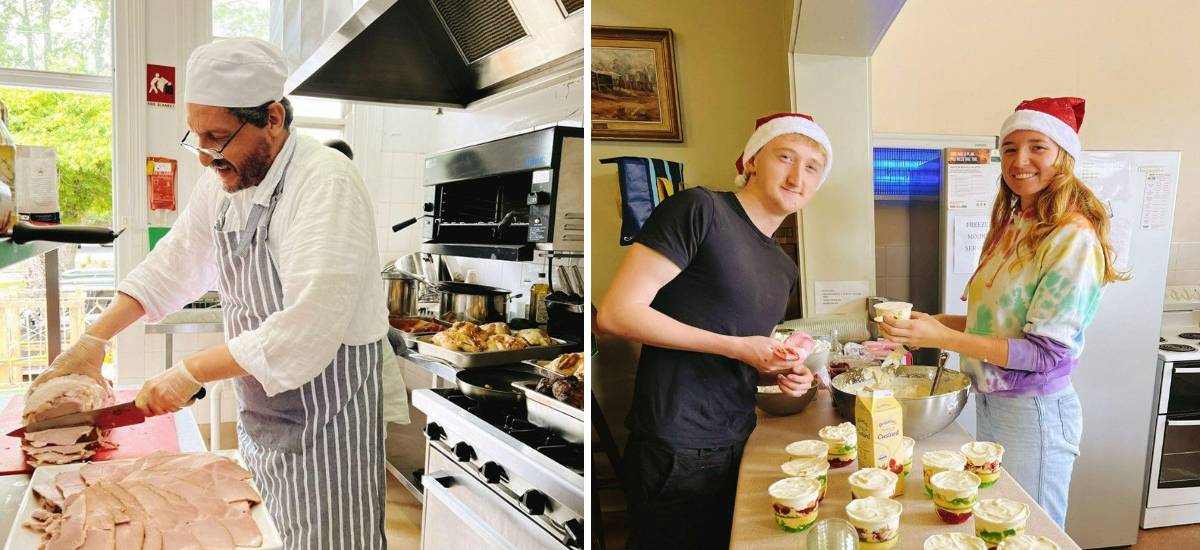
Volunteer chef Xavier and volunteers Max and Bridey making trifle at the Christmas Day lunch. (Photos supplied)
A way of living
When I first went to the Vegie Patch and sat with Mel out the back next to the cool room, I’d felt right at home. We laughed about the desiccated rogue turnip we’d both noticed as she was telling me how everything gets used one way or the other. I’d watched the way she interacted with her staff and the delivery man who came to drop off apple juice. She spoke to me in the same way: clearly, matter-of-factly, and from the heart.
“I do as much as I can,” Mel says, but she stresses that no one has to do everything. “We can all just do little things. At the end of our lives, I always say, especially to my staff, it doesn’t matter what you did in your life, it’s how you did it. Did you do it well? Did you care about what you did in that day? Change comes for us and the world when we put our best foot forward.”
Take Action:
- Support Mel’s vision and the community by buying local.
- Join the Affiliate Growers’ Program.
- Grow your own fruit and vegetables for health and wellbeing.
Share this article:
This story has been produced as part of a Bioregional Collaboration for Planetary Health and is supported by the Disaster Risk Reduction Fund (DRRF). The DRRF is jointly funded by the Australian and New South Wales governments.
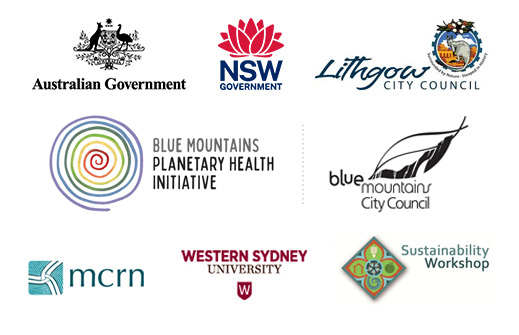
More from around the region
@ bluemountainsplanetaryhealth . Apr 2

@ bluemountainsplanetaryhealth . Apr 1

In our `How to Build a Survival Garden in the Blue Mountains` workshop on Saturday 5 April, we`ll be starting an Upper Mountains Seed Saving group and sharing seeds, tubers, recipes for more unusual foods, and information about the many ways we can create more food system diversity and resilience. Learn about skirret, salsify, collards, cardoons, sea kale, Good King Henry, mangel wurzel, oca, yacon and more. Places are limited so bookings essential here (link in profile) : bit.ly/4kVAUA8
#foodsystems #foodsecurity #fooddiversity #foodresilience #biodiversity #planetaryhealth #healthydiet #plantbased #katoomba #bluemountains
@ bluemountainsplanetaryhealth . Mar 31

Was that a frog or cricket you heard? Check out our video matching the photos of the 20 frogs of the Blue Mountains Mountains with their calls so you can learn the difference. View our exhibition, learn how to use the FrogID app, and how to build a frog pond and frog hotel, at our workshop this Saturday 5 April at 9am. Bookings via via link in profile. You can view our full video on YouTube (link in profile). Subscribe for more great content. #frogs #bluemountainsfrogs #planetaryhealth #katoomba #frogcalls #exhibition #workshop
@ bluemountainsplanetaryhealth . Mar 30

A huge thank you to the Blue Mountains Interfaith Group for organising an inspiring afternoon that brought community together and renewed our sense of connection, hope, wonder, shared purpose and commitment to care for our extraordinary planet. We had a full house with the Frogs of the Blue Mountains looking over our shoulders! Next Saturday 5 April we`ll be launching Saturday morning T`ai-chi and Qigong which will continue on the first Saturday of every month. Bookings essential here (link in profile): bit.ly/3Rn9RzY #interfaith #hope #wonder #commitment #connection #community #planetaryhealth #katoomba #bluemountains #taichi #qigong
@ bluemountainsplanetaryhealth . Mar 29

@ bluemountainsplanetaryhealth . Mar 29

@ bluemountainsplanetaryhealth . Mar 28

Our Planetary Health Newsletter is out! Read it here https://bit.ly/4l7sC89 (link in profile) to find out how Planetary Health has been at the core of Blue Mountains City Council`s Sustainability Model and Map for Action for 25 years and what it means; watch our `We Are Nature` video and our latest video on the Frogs of the Blue Mountains and all their calls; read about how we`re focusing on what connects us, not what separates us, at the Interfaith Gathering this Sunday 30 March; learn how you can take action for Planetary Health on Saturday 5 April with T`ai-chi & Qigong, workshops on the Frogs of the Blue Mountains and building Survival Gardens; and participating in Planetary Health Bushcare. There`s also still time to apply for our Conference and Events Organiser position at the Planetary Health Centre. You can subscribe to receive the newsletter at any of our local news sites, like www.katoombalocalnews.com (link in profile)
@ph_alliance
#planetaryhealth #sustainability #jobs #taichi #qigong #survivalgardens #frogs #bluemountains #katoomba #mapforaction #sustainabilitymodel #wearenature #interfaith #bushcare #community #action
@ bluemountainsplanetaryhealth . Mar 27

Did you know that this is a Screaming Tree Frog, and that there are at least 20 different known frogs in the Blue Mountains? Join our workshop on Saturday 5 April to view all of them at the Planetary Health Centre, and learn how to use the FrogID app to record and identify their calls. We’ll also be demonstrating how to build a pond or frog hotel to increase habitat for them. Reserve your spot in the workshop here (link in profile):
https://www.eventbrite.com.au/e/the-frogs-of-the-blue-mountains-tickets-1281801285149
Photo: Alexander Dudley
@frogidaus
#frogs #bluemountainsfrogs #screamingtreefrog #planetaryhealth #skillshare #habitat #froghabitat #frogcalls #katoomba #bluemountains
@ bluemountainsplanetaryhealth . Mar 26

We are starting Saturday morning T`ai-chi and Qigong at 8am on Saturday 5 April at the Planetary Health Centre.
Places are limited so bookings essential here (link in profile): https://bit.ly/3Rn9RzY
T`ai-chi and Qigong routines can increase mobility and strength, improve immunity and help build an inner calm - a great way to start the weekend!
The monthly practice at the Planetary Health Centre is suitable for people with a little or lots of experience. Join us on the 1st Saturday of the month at 8 am, to nourish your body, mind and spirit or 3 treasures (in Chinese, Jing, Chi and Shen, or San Bao)
Virginia Field is an experienced trainer of T`ai-chi/Qigong, with more than 30 years experience.
This activity is the first in a full day of Skillshare activities at the Centre:
8am T`ai-chi and Qigong
9am-3pm Fashion Upcycling
9am Frogs of the Blue Mountains and how to help them
10am-1pm How to Build a Survival Garden in the Blue Mountains
1.30-4.30pm Planetary Health Bushcare
Contact Lis on 0407 437 553 for more information.
#taichi #qigong #innercalm #mobility #personalhealth #planetaryhealth #katoomba #bluemountains #planetaryhealthcentre
@ bluemountainsplanetaryhealth . Mar 25

Bookings are now open for our very popular Upcycled Fashion Program on Saturday 5 April. Learn how to use a machine, how to mend, sew, adjust and remodel clothes, and how to create your own patterns to use up all that fabric you`ve been collecting! If you`re interested in earning money, you can also be supported to become part of the Repair Network helping keep textiles out of landfill. Places are limited so get in early to book your place here (link in profile):
https://bit.ly/4c2Go85 #upcycling #upcycledfashion #skillsharesaturday #planetaryhealth #keepingtextilesoutoflandfill #skillshare #katoomba #bluemountains #sustainability #socialenterprise
@ bluemountainsplanetaryhealth . Mar 24

We are looking for a Professional Conference & Events Organiser to join our team at the Planetary Health Centre! If you`re keen to make a difference and demonstrate how events can be run sustainably and help inspire change, we`d love you to work with us! Applications close 30 March. Scroll down to learn more here (link in profile): https://www.bmcc.nsw.gov.au/jobs and ring Lis on 0407 437 553 if you`d like to discuss. Please share if you know anyone who might be interested! #jobs #hiring #conferenceorganiser #eventsorganiser #planetaryhealth #careers #inspiringchange #sustainableevents #applynow
@ bluemountainsplanetaryhealth . Mar 23

Would you know what to prioritise if you needed to build a survival garden in the Blue Mountains? Do you know how families survived and stayed healthy during the Great Depression? What would you need to grow to provide all your nutritional needs on a plant based diet? How can you have fruit all year round in a cold climate? Have you grown salsify, skirret, yacon or American Ground Nut and would you know how to cook them? We’ll answer all these questions in our ‘How to Build a Survival Garden Workshop’ at the Planetary Health Centre from 10am to 1pm on Saturday 5 April. We’ll discuss how we can work together to make our local food system healthier and more resilient and we’ll have planting guides, recipes and some seeds, bulbs and tubers available to get you started. Places are limited so bookings essential here (link in profile): https://bit.ly/4kVAUA8
#growyourown #survivalgarden #salsify #skirret #yacon #oca #bluemountains #permaculture #planetaryhealth #seedsaving #foodsecurity #healthyfood #gardening #communityfarming



